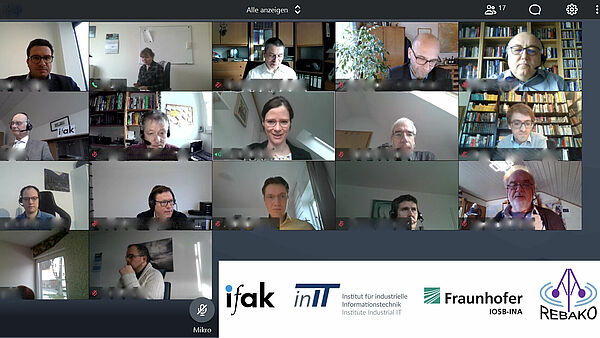In production systems, wireless communication systems such as WLAN or Bluetooth, and in the future 5G, are increasingly being used for data and information exchange. They ensure simplified commissioning, operation and maintenance, ultimately resulting in lower production costs. For some automation applications, this requires highly available, deterministic and fast radio communication. In addition, there is often the requirement to provide applications with highly accurate timing information.
In contrast to wired communication, one of the biggest challenges is the parallel operation of radio communication applications in license-free frequency ranges that are allocated in a technology-neutral manner. In a typical production plant, different types of radio applications can be expected, which have communication needs with different requirement profiles or different priorities. These requirements cannot be met adequately if they are not coordinated. Further challenges also exist in the future use of new frequency ranges and in new mobile radio applications for industry, such as 5G. Here, cross-cell interference cannot be ruled out and should therefore be avoided.
It is precisely these challenges that the REBAKO project - Controller-based Coexistence Management of Diverse Radio Communication Systems - is addressing. The project consortium includes the Institute for Automation and Communication (ifak) Magdeburg, as well as the two Lemgo-based research institutes Fraunhofer IOSB-INA and the Institute for Industrial Information Technology (inIT) of the Ostwestfalen-Lippe University of Applied Sciences. On February 18, 2021, the project partners met together with the project monitoring committee and DFAM representatives to kick off the project in a virtual conference.
The goal of the project is to implement a controller-based approach for automatic coexistence management to manage unpredictable changes in the wireless communication channel during the operational phase and maintain uninterrupted operation of all systems under these conditions. "We have the perfect location for implementing the project in Lemgo, because this is where real-time-capable wireless communication for factories is being developed. The topic of 5G is also being used here at Innovation Campus Lemgo in a promising way, so we can also accommodate this know-how within the REBAKO project," says inIT project manager Professor Henning Trsek. In addition, a reference implementation is to be created to validate the concepts developed, which will serve as a basis for further exploitation and subsequent industrial use.
For this purpose, results from previous projects, such as KoMe or HiFlecs, will be used and the existing solution approaches will be supplemented by an automatic coexistence management as well as the temporal resource allocation according to the existing communication requirements. The solution approach is based on the identification and classification of different radio systems and interferers, which is provided to a central controller as an actual value of the radio channel. The controller thus performs a continuous actual value to setpoint comparison and automatically allocates the required communication resources to the wireless systems. An important component for the envisaged solution is a clock synchronization of the different wireless systems and the controller, since it is indispensable for the new computing algorithm in the controller. This is primarily within the remit of Fraunhofer IOSB-INA.
"We have bundled expertise in the project consortium. At Fraunhofer IOSB-INA, we develop integration solutions for the time-based applications and work on the required integrated and adaptive clock synchronization to implement the rule-based coexistence management. Colleagues at inIT are developing a sensing solution for continuous monitoring of the wireless channel. Using deep learning approaches from artificial intelligence, they capture and classify the multidimensional usages, i.e. space, time and frequency, of the available frequency spectrum," summarizes Fraunhofer IOSB-INA project manager Sebastian Schriegel. At ifak, the controllers for resource planning and allocation in wireless networks are being developed in real time. A demonstrator is to be created at SmartFactoryOWL to illustrate the results and test their practicality. The project is funded by the German Federal Ministry for Economic Affairs and Energy and will run for three years.
Controller-based coexistence management for radio communication systems
The starting signal for the REBAKO project has been given


